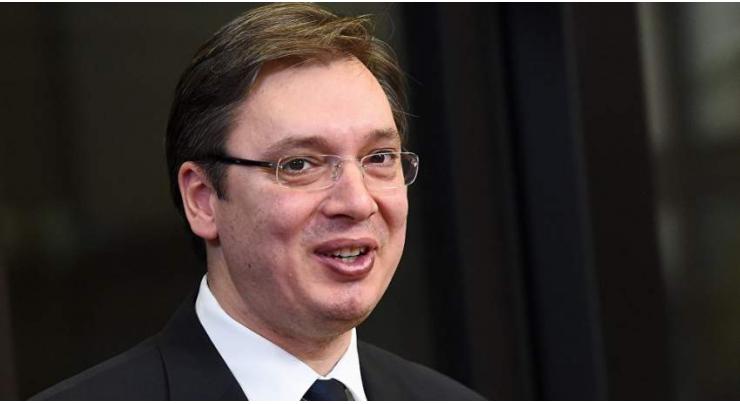
- Home
- Business
- News
- Serbian President Calls Western Stance on Russian Gas Transit via Balkans 'Hypocritical'
Serbian President Calls Western Stance On Russian Gas Transit Via Balkans 'Hypocritical'
Faizan Hashmi Published January 18, 2019 | 10:55 PM

Serbian President Aleksandar Vucic slammed on Friday Western countries for what he described as a hypocritical position on gas transit from Russia via the Balkan states
A day after his meeting with Russian President Vladimir Putin, Vucic pointed out that all of the alternatives to Russian gas transit, including via Azerbaijan, did not provide enough volumes and were more expensive. Belgrade is interested in participating in the extension of the TurkStream gas pipeline after the South Stream gas pipeline, designed to transport Russian gas through the Black Sea to the Balkans, had to be abandoned due to the European Union's Third Energy Package, which stipulated that companies engaged in gas production could not be owners of the main pipelines located in the region.
"What a hypocritical position ... Germany is very firm and Chancellor Angela Merkel is making no concessions despite the US pressure [aimed at undermining] the Nord Stream 2 [gas pipeline project]," Vucic said.
He pointed out that Germany had finished all the work needed to receive gas from the new Russian pipeline.
"So, the EU countries have a right to get this gas, so why are we, the Serbs, deprived of this right? The transit route could pass through Serbia. Gas would later be transported to Bosnia and Herzegovina, despite the fact that we are not controlling the territory of Kosovo and Metohija now, and also to Montenegro via Kosovo and Croatia," Vucic said.
He also spoke about opportunities for Serbia to get gas from Turkey via TurkStream and from pipelines that are transporting Russian gas via Ukraine.
Nord Stream 2 is a joint venture of Gazprom and five European companies. It aims to deliver 55 billion cubic meters (1.9 trillion cubic feet) of Russian gas annually to the European Union. The project has been welcomed by some countries in Europe and opposed by others that feel it might increase their dependence on Russia.
Related Topics
Recent Stories

Currency Rate In Pakistan - Dollar, Euro, Pound, Riyal Rates On 25 April 2024

Today Gold Rate in Pakistan 25 April 2024

Mired in crisis, Boeing reports another loss

Session Awarding Ceremony 2024 held at Cadet College Muzaffarabad

Austrian ski great Hirscher to make comeback under Dutch flag

Pakistan, Japan agrees to convene 'Economic Policy Dialogue'

FM Dar conveys deepest sympathy on torrential rains devastation in UAE

Spain PM Sanchez says weighing resignation after wife's graft probe

Tennis: ATP/WTA Madrid Open results - 1st update

Long-lost Klimt portrait auctioned off for 30 mn euros

Osaka seals first win on clay since 2022 in Madrid

Earthquake jolts Karachi
More Stories From Business
-

Currency Rate In Pakistan - Dollar, Euro, Pound, Riyal Rates On 25 April 2024
29 minutes ago -

Today Gold Rate in Pakistan 25 April 2024
54 minutes ago -
Meta profits soar but costs of AI cause worry
2 hours ago -

Mired in crisis, Boeing reports another loss
10 hours ago -

Pakistan, Japan agrees to convene 'Economic Policy Dialogue'
10 hours ago -

British-Pakistani firm unveils $35 million luxury apartments for overseas Pakistanis in Islamabad
11 hours ago
-

European stocks lose momentum after global rally
11 hours ago -

New pulses varieties imperative to cater domestic food requirements: Dr Khalid Hasan
12 hours ago -

CEO KP-EZDMC meets CRBC officials
12 hours ago -

Pakistan among nine poor countries that produces 90 percent cigarettes for world
13 hours ago -

Chief Minister Gilgit Baltistan Haji Gulbar Khan calls on Minister for Privatisation
13 hours ago -

Germany nudges up growth forecast, ailing economy at 'turning point'
13 hours ago
















